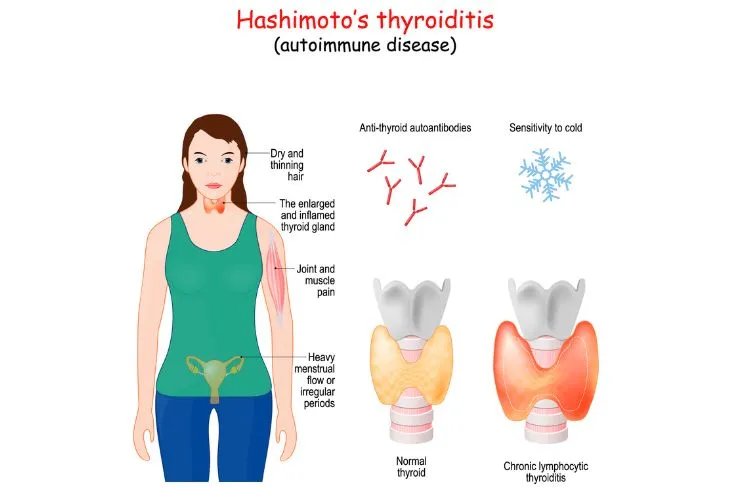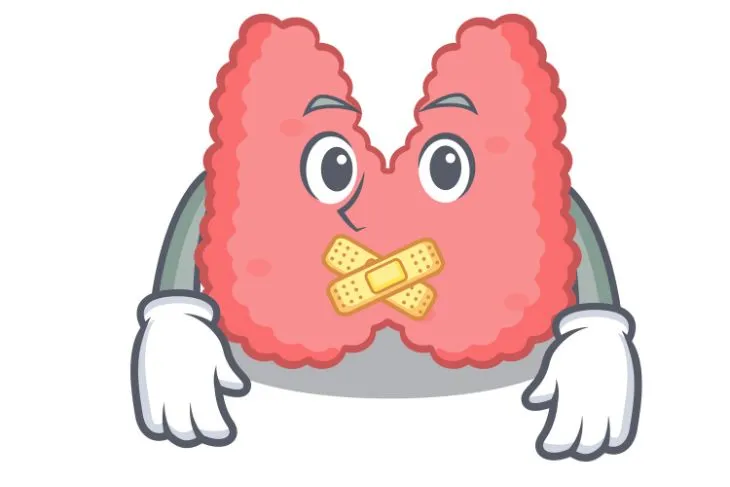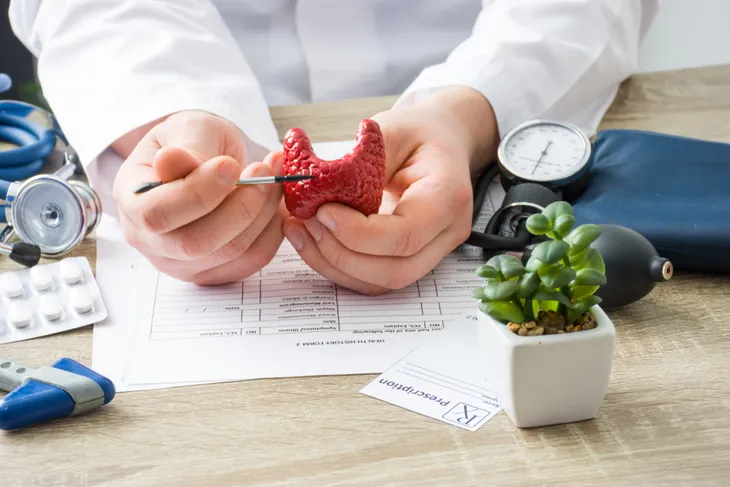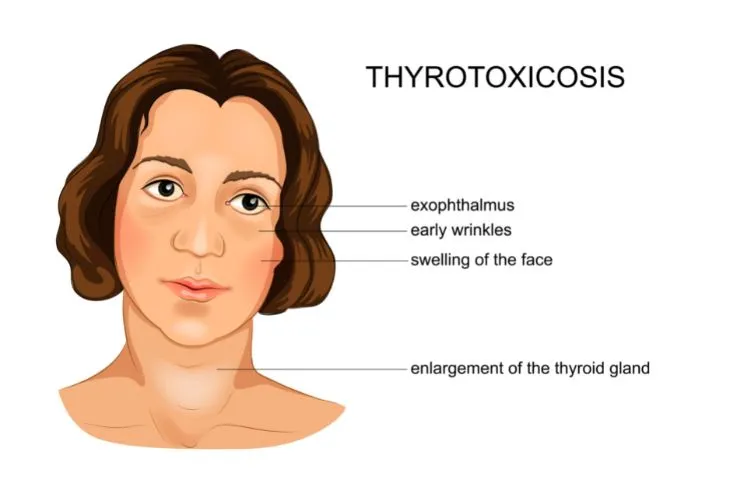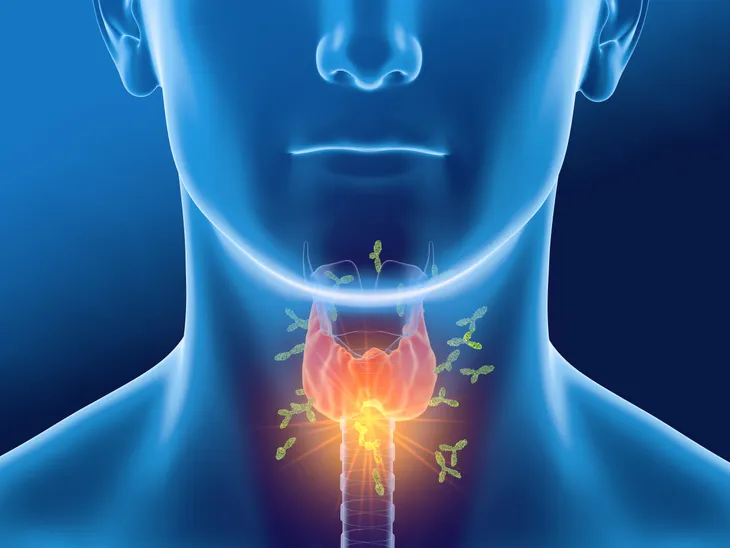- Thyroiditis is the swelling of the thyroid gland caused by either unusually high or low thyroid hormone levels in the blood.
- There are several different types of thyroiditis, but the most common are Hashimoto’s thyroiditis, subacute, postpartum, and silent thyroiditis.
- Symptoms vary, but often include fatigue, swelling at the base of the neck, and sometimes pain in the front of the throat.
- Treatment depends on the type and case, but can often be treated with medication.
We don’t pay much attention to our thyroid, the butterfly-shaped gland in the front of our throat, but it plays a big role in our overall health. According to WebMD, it controls our metabolism by making hormones that affect how our heart, brain, and other areas of the body function. About 20 million Americans have some form of thyroid disease, including thyroiditis.
Thyroiditis is one of the many conditions that can affect our thyroid. While there are many different types, overall it is the swelling of our thyroid gland. It can happen to anyone, but is more common among women, particularly women in early adulthood to middle age. Here’s an in-depth look at thyroiditis, including the symptoms, causes, and treatment options…
Phases of Thyroiditis
Regardless of the specific type of thyroiditis a person has, it will follow through three phases. The first phase is thyrotoxic phase. During this phase the thyroid becomes swollen and will release too many hormones, explains WebMD. Next it will move into hypothyorid phase. After a few weeks or months go by, the thyroid will have released so much of the hormone that it leads to hypothyoridism, when there’s not enough left.
The last phase is euthyroid phase. WebMD describes this phase as being “normal.” Thyroid levels return to where they should be. This can happen between the first two phases or at the end when the swelling has gone down.
Types of Thyroiditis
Hashimoto’s Thyroiditis
This is the most common type of thyroiditis. During Hashimoto’s thyroiditis, the immune system attacks the thyroid, slowly weakening it overtime, says WebMD. It becomes so worn down that it eventually can no longer make enough hormones. This attack not only damages the thyroid, but also causes it to swell.
“As the thyroid is destroyed over time, it’s unable to produce enough thyroid hormone,” writes NHS. “This leads to symptoms of an unactive thyroid gland (hypothyroidism), such as tiredness, weight gain, and dry skin.” The swelling in the thyroid can cause a goiter (lump) to form in the throat, adds the source.
Experts are still unclear why this happens and what causes the immune system to attack the thyroid gland. It happens slowly, over a period of months or even years before most people notice. Unfortunately, it isn’t curable, but the symptoms can be treated with medication. NHS reassures that surgery is rarely needed and would only be considered in cases where the goiter is uncomfortably swollen or cancer is suspected.
De Quervain’s (subacute) Thyroiditis
Subacute thyroiditis is often triggered by an infection which results in somewhat of a pattern in how the thyroid functions. The first symptom will be pain in the thyroid and neck area, according to WebMD. After this, the thyroid will begin making too much hormone which leads to hyperthyroidism.
Afterwards, the thyroid starts to work normally, “followed by a time where the thyroid produces too little thyroid hormone,” writes the source. When this happens it’s called hypothyroidism. After a period of about 12 to 18-months the thyroid will begin functioning normally again.
Postpartum Thyroiditis
As the name quite clearly states, this type of thyroiditis occurs within a year after childbirth. According to NHS, this type of thyroiditis is uncommon and most often occurs in women who have a previous history of thyroid issues or type 1 diabetes.
“In postpartum thyroiditis, the immune system attacks the thyroid within around 6-months of giving birth,” writes the source. “This causes a temporary rise in thyroid hormone levels (thyrotoxicosis) and symptoms of an overactive thyroid gland.” After a few weeks the gland becomes depleted, leading to low thyroid hormone levels and symptoms of an underactive thyroid.
As long as the condition is treated, the thyroid is able to recover within 18-months.
Silent (Painless) Thyroiditis
Just like the name suggests, this type of thyroiditis occurs silently and often goes undetected. Similar to postpartum thyroiditis, as long as individuals receive treatment, the thyroid will cover in about 18-months. According to WebMD, silent thyroiditis begins with overproduction of hormones (thyrotoxicosis), followed by a longer period of the thyroid making too little.
“If low thyroid levels are causing severe symptoms, medicine may be needed until the condition gets better,” writes NHS. “Occasionally, the low thyroid levels can be permanent.”
Rare Types of Thyroiditis
The following types of thyroiditis are much more rare, but possible. The first is a drug-induced thyroiditis that occurs as a result of certain medicines (i.e. cancer or bipolar medication). In this case the medicine damages the thyroid gland, resulting in symptoms of either an overactive or underactive thyroid. Thankfully, NHS points out that the symptoms often resolve after the person stops taking the medication. Regardless, never stop taking a medication without discussing it with your doctor.
Next up is radiation-induced thyroiditis which is exactly what it sounds like — a thyroid gland that has been damaged by radiotherapy or radioactive iodine treatment for an overactive thyroid, says NHS. In this case, the person may have symptoms of an overactive thyroid gland or underactive thyroid gland. The source also notes that low thyroid hormone levels are often permanent and require medication long-term.
Acute or infectious thyroiditis is the result of a bacterial infection. This type of thyroiditis is rare and often occurs in people with a weak immune system or children with issues pertaining to the development of their thyroid. The accompanying symptoms are pain in the throat, general feeling of malaise, swelling of the thyroid gland, and sometimes symptoms of an overactive or underactive thyroid, adds NHS. As long as the infection is treated with antibiotics, these symptoms should improve.
Symptoms of Thyroiditis
The symptoms associated with thyroiditis vary based on the type and what phase it is in. According to the Cleveland Clinic, most types of thyroiditis result in thyrotoxicosis symptoms. Afterwards, hypothyroid symptoms will begin occurring. The most common symptoms are fatigue, swelling at the base of the neck, and sometimes pain in the front of the throat, adds WebMD.
Other symptoms vary depending on whether the thyroid is underactive (hypothyroidism) or overactive (hyperthyroidism). “Subacute thyroiditis and acute infectious thyroiditis usually also cause pain in your thyroid area. Some people with thyroiditis have an enlarged thyroid gland (goiter),” notes the Cleveland Clinic.
Symptoms of Thyrotoxicosis
This first phase of thyroiditis, the thyrotoxic phase, is usually quite short. The Cleveland Clinic points out that it usually only lasts one to three months. “If your thyroid cells are damaged quickly and there’s a leak of excess thyroid hormone, you might experience symptoms of hyperthyroidism (overactive thyroid),” writes the source.
Symptoms of hyperthyroidism include an increased heart rate and appetite. You might also have unexplained weight loss, anxiety or nervousness, irritability, trouble sleeping, increased sweating and sensitivity to heat, as well as some tremors, notes the source.
Symptoms of Hypothyroidism
This phase of thyroiditis can last for a long time and even has the potential to become permanent. In this phase the thyroid cells may become damaged and thyroid hormone levels may fall. If this happens, the Cleveland Clinic warns it could bring on symptoms associated with hypothyroidism.
Symptoms we commonly see with hypothyroidism are fatigue, weight gain that is unexplainable, constipation, depression, dry skin, sensitivity to cold, muscle weakness, and an inability to focus or concentrate.
Who Does it Affect?
This condition can happen to anyone, but it is more common among women, particularly adult women. The most common form of thyroiditis is Hashimoto’s thyroiditis which affects about 1 to 2-percent of Americans. “Hashimoto’s thyroiditis is four to 10 times more common in [females] than [males],” writes the Cleveland Clinic. Particularly in women between the ages of 30 and 50.
Silent and painless thyroiditis also tends to occur more in women and is the next common type of thyroiditis behind Hashimoto’s thyroiditis. All other types of thyroiditis are much more rare, notes the Cleveland Clinic.
What Causes Thyroiditis?
Thyroiditis is often classified as an autoimmune disease because it occurs as a result of an attack on the thyroid. The result is inflammation and damage to the thyroid cells, says the American Thyroid Association. According to the source, it’s the antibodies that attack the thyroid that cause most types of thyroiditis. “It is not known why certain people make anti-thyroid bodies, although this tends to run in families,” writes the source.
Antibodies aren’t the only cause of thyroiditis. It can also be the result of an infection, such as a virus or bacteria, warns the American Thyroid Association, or certain drugs that damage the thyroid cells. Both cases will cause inflammation in the thyroid and result in thyroiditis.
Thyroiditis Treatment
The form of treatment a person will receive all depends on the type of thyroiditis they have. For example, WebMD explains that hypothyroidism is treated with synthetic versions of thyroid hormone. This treatment comes in the form of an oral medication. When their metabolism returns to normal, the medication will likely be adjusted.
If a person has hyperthyroidism it will all depend on the type of inflammation associated with it and any occurring symptoms. “Beta-blockers often treat symptoms like a fast heart rate and palpitations. Antithyroid medicines can lower the amount of hormones that your thyroid is making,” writes the source. In this case a doctor can prescribe some form of radioactive iodine that will work to shrink the thyroid and reduce symptoms.
Thyroid pain can just be treated with pain medication, however if the pain is severe it might require alternative treatments. Surgery is rare but may be necessary if other treatments don’t work.


